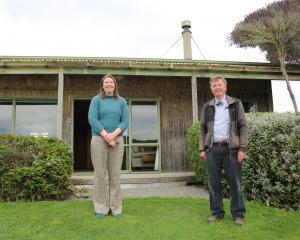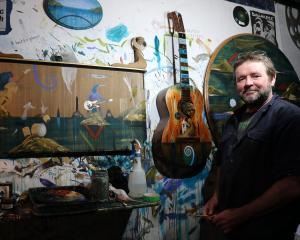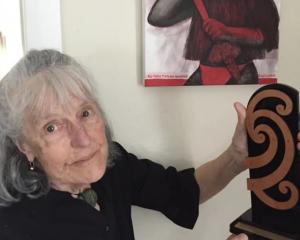When Australian-born, Scotland-based conductor Jessica Cottis was asked to conduct a concert to commemorate the 100th anniversary of the outbreak of World War 1 for the Southern Sinfonia, she thought of French composer Maurice Ravel (1875-1937) and English composer Ralph Vaughan Williams (1872-1958).
Both had served in the war, Vaughan Williams in the medical corps and Ravel as a truck driver, both wrote pieces in memory of friends who had been killed in the war, Vaughan Williams had studied with Ravel in Paris in 1908 and they were also friends.
''There are wonderful stories of Vaughan Williams dragging Ravel across to Waterloo Station and making him eat steak and kidney pie, poor Ravel,'' she said.
The concert opens with Ravel's Le Tombeau de Couperin, a kind of homage to the baroque French keyboard suite as well as a memorial to friends who died in the war. Although he originally wrote it for piano, he later orchestrated four of the six movements. It's quite a wistfully light-hearted piece, Cottis says.
Ravel's Piano Concerto for the Left Hand was commissioned by Austrian concert pianist Paul Wittgenstein, who lost his right arm during the war. It is infused with some chromatic, jazzy harmonies and is fiendishly difficult.
It will be performed by Australian pianist Kristian Chong, whom she first met when they were both in the keyboard finals of the Symphony Australia Young Performers Awards in 2000. Although neither of them were selected, they remained friends and she is looking forward to making music with him again, she says.
Vaughan Williams' Pastoral Symphony, written in 1922, was inspired by hearing a bugler practising.
''The bugler accidentally played a 7th instead of an octave and this led to Vaughan Williams imagining the trumpet cadenza in the second movement, which is an incredibly haunting melody. It's unbelievably beautiful, an elegy for the dead of World War 1. It's very meditative and evocative,'' she said.
''There are a couple of places in this symphony where you are lulled into this sense of reflection and then all of a sudden he picks you up and carries you to this awfully grand and majestic place and the music just wells through you. I think really top-class music does affect us in a physical way.''
For Cottis, music is an aural depiction of our emotions - ''all those things we feel inside that we can't actually describe in words, even if we tried; we just never can articulate. That's what we have in music, whether we are playing it or actually listening,''
Cottis started playing piano before she could talk. Her mother was her first teacher, and at 18 she was playing organ, studying first in Canberra then in Paris, then working in London at St Stephen Walbrook church.
But disaster struck in the form of carpal tunnel syndrome and she lost the feeling in the fourth and fifth fingers of her left hand from overuse. Although treatment was moderately successful, it was not enough for her to continue giving recitals, she said.
''It was pretty devastating. I'd been playing keyboard instruments all my life and to have to stop from an injury like that was a big part of me cut out. It took me a little while to work out what I should go and do next.''
She thought she might get a ''proper job'' and studied law for a while but also applied and was accepted into a conducting course at the Royal Academy of Music in London.
The month before she graduated in 2009, she auditioned for a position as assistant conductor with the BBC Scottish Symphony Orchestra and got the job. It seemed like a sign that conducting was the best route for her, she said.
Since then her career has followed a fast trajectory and she has been mentored by several prominent conductors, including the late Sir Colin Davis at RAM, Donald Runnicles at the BBC Scottish, and, as assistant conductor at the Sydney Symphony, with Vladimir Ashkenazy and Charles Dutoit.
''The secret of a good conductor, besides talent and hard work, is you have to be a real leader. A really great conductor, I think, has something really profound to say artistically and musically, then on top of that they are able to imbue that in their body movement and the way they are in rehearsals to really inspire the players to play in that way and that requires strong leadership skills.''
For every hundred aspiring conductors there may be one who actually has everything that's needed to be a good conductor, Cottis says.
''The really great conductors work with the orchestras and take what the orchestras give them and make that work with their own vision.''
Cottis is busy: conducting the San Francisco Symphony Orchestra and other concerts in London before starting a tour of New Zealand with the New Zealand Symphony Orchestra's Young People's Concerts and conducting the Southern Sinfonia's concert on March 29, then a concert in Adelaide, two in her home town of Glasgow, and back to Australia by the end of May where she is assistant conductor with the Sydney Symphony Orchestra.
''It's a difficult thing to make sure there is enough time to prepare the music in advance. Obviously it all works out OK, but if you think a 40-minute symphony takes hours and hours of work, it does mean working solidly every day of the week,'' she said.
''It's not an easy profession. What people see in a concert is really the tip of the iceberg, for all the musicians on stage actually. It's not just knowing all of the right notes and where they go and so on. It's actually coming up with something that does justice musically to the piece and your own vision of it.''
She believes it is important to know the performance lineage of a piece and listens to many recordings of it, such as the first performance of the Vaughan Williams symphony conducted by Sir Adrian Boult with the composer present.
However, she says once she starts learning the work she doesn't want to be infected by how other people do it.
Cottis is one of a number of young female conductors, a hot topic these days as there have not been many of them in the past and none of the really top orchestras have a female principal conductor, she says.
''I know that if I had realised it was possible to be a female conductor when I was younger, if there had been more role models, then I think I would have started conducting earlier.
''I hope it's different now, in that there's a new generation of younger conductors, myself included, that young girl musicians can see, for instance with the NZSO education concerts, all those children will see a female conductor, and that's really encouraging, I think.''
See it, hear it
The Southern Sinfonia, conducted by Jessica Cottis, will open its subscription series of concerts with ''We will remember them'' at the Dunedin Town Hall on March 29 at 8pm. It features Ravel's Le Tombeau de Couperin and Piano Concerto for the Left Hand, with Kristian Chong on piano, and Vaughan Williams' Symphony No 3, A pastoral symphony.












